Customized Stop-the-Slip Solutions
For Your Unique Conditions
Your Stop-the-Slip Solutions Graded:
Handi-Treads: A-
Handi-Treads aluminum treads are the most effective, long-lasting solution for minimizing the risk of slips and falls on wooden access ramps. Because ramps are inclined, they encourage slips and falls. When you add external conditions like rain, algae or snow to a ramp, the slip and fall hazard increases dramatically.
Handi-Treads offer immediate traction on specific areas of the ramp, including landings, the bottom or top of a ramp. The pressure from a foot stepping on the rigid raised buttons pushes away the layer of moisture, frost or up to an inch of snow, creating solid contact between the tread and sneaker, shoe or boot.
Installation of the aluminum Handi-Treads is simple. Unlike grit paint, there’s no need for time-consuming and messy surface preparation. Once installed, no maintenance is required for Handi-Treads, which are guaranteed to last a lifetime in consumer applications.
If you live in an area where it snows, you can use a snow shovel on your Handi-Treads without fear of damage to the treads. This is not the case with most other solutions.
The initial cost to fit a shorter ramp with Handi-Treads will be higher than less effective and durable alternatives, but the payback will come in less maintenance and a substantially longer product life. We recommend spacing the treads at four inches apart, but have seen successful installations with longer intervals.
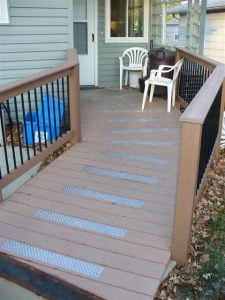
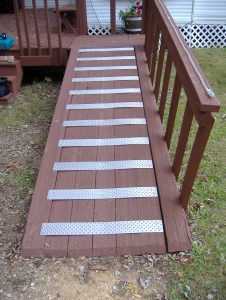
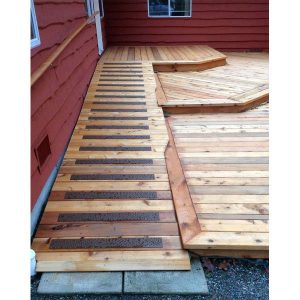
Total Score: A-
Effectiveness: A
Installation & Maintenance: A
Durability: A
Initial Price: C
Long-Term Value: A
Non-Slip Grit Tape: D
Non-slip grip tape can be a short-term solution to reduce slips and falls on specific areas of a wood ramp. Rain and frost are easily dealt with by grit embedded into the tape. However, once it snows the trouble really begins. You simply can’t use a snow shovel on grit tape. Not only will you pull the tape right off the stairs if you catch an edge, but even a plastic blade will quickly defeat the thin coating protecting the aggregate.
The proper installation of non-slip grip tape does require a bit of effort as detailed here. It’s important that the wood surface, whether stained or painted, is clean, dry and in good shape. Heavily grained, uneven or splintering wood makes it difficult for the tape adhesive to completely bond and the effective life of grip tape is directly related to how carefully and completely it has been adhered to the steps.
There’s no maintenance that can or should be done to the tape other than to be very careful of the edges and corners, which can be easily pulled up. Once a corner or edge begins to peel, the grip tape will quickly deteriorate.
If you’re comfortable with a lifespan on outdoor wood of six months to a year, grit tape can be an inexpensive temporary solution.
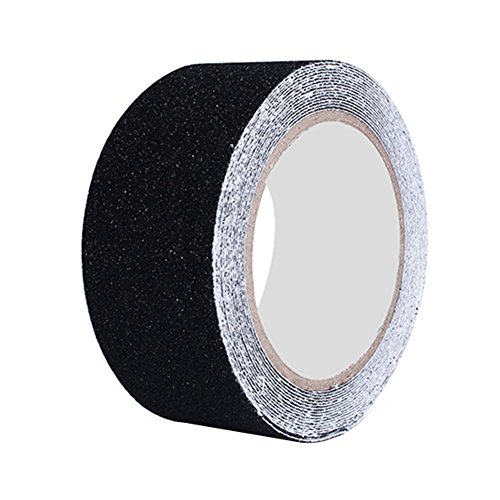
Total Score: D
Effectiveness: D
Installation & Maintenance: D
Durability: D
Initial Price: A
Long-Term Value: D
Heavy Duty Rubber or Fiber Mats: C
Heavy duty rubber or fiber mats can be an effective, temporary way to increase the traction on a wood ramp, if the mats are ADA compliant.
The Americans with Disabilities Act requires that mats be attached securely to the ramp and landings, and that the mats have beveled edges if over 1/4″ in thickness. This means that mats cannot be simply thrown down.
While rubber runners handle moisture with ease, they must be kept free of snow, if they are to be effective in the winter. The channels or cut outs that provide traction in the wet can also hold ice and snow. Care must be taken when using a snow shovel with rubber runners as even a plastic blade can cut the rubber. Snow is best removed from the heavy duty rubber runners by picking them up off the ramp and shaking the snow off. This procedure must be repeated several times during a heavy snow, increasing both the time and cost required to use them as a slip-and-fall solution.
Rubber mats must also be cleaned fairly frequently as dirt and debris are easily caught and captured in the grooves or holes that provide traction and drainage.
Depending upon thickness and quality of the rubber or fiber mat material you can expect the mat to last 2 to 4 years.
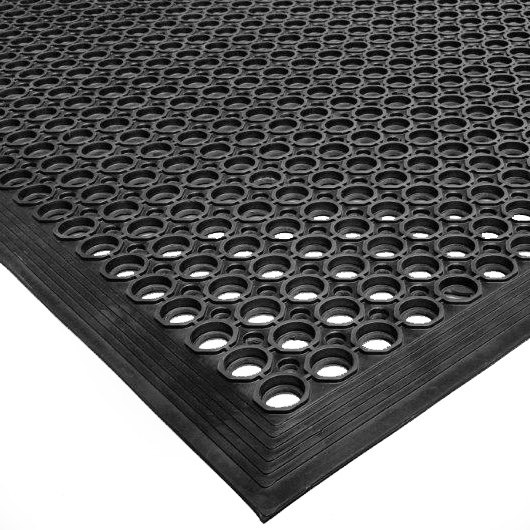
Total Score: C
Effectiveness: C
Installation & Maintenance: D
Durability: C
Initial Price: B
Long-Term Value: C
Grit Paint: C
Grit paint can improve the safety of specific areas of a wooden outdoor ramp if (1) it’s a high-quality enamel or epoxy paint, (2) it’s applied meticulously and (3) it’s maintained properly. Like grit tape, non-slip paints include an aggregate that creates traction. The best anti-slip paints contain aluminum oxide or carborundum that are encapsulated in the paint, creating a rough, slip resistant surface. We rate the effectiveness of grip paint very high for wet weather and frost, but it’s ineffectual with snow.
Longevity is another challenge with anti-slip paint when used on a wood ramp. The incline of the ramp creates much more pressure between shoes and, more often than not, the wheels of wheelchairs, hand trucks and dollies. This increased pressure leads to a shorter life and the need to repaint the ramp after two to three years.
There is no maintenance that can be performed on anti-slip paints other than regular sweeping.
However, if you live where it snows you need to be very careful not to aggressively shovel a ramp painted with grit paint. While the epoxy or enamel coating is durable under normal foot traffic, it’s no match for an aluminum or even plastic snow shovel. Once you start to scrape way the thin paint layer covering the aggregate, the system will quickly degrade.
The cost of a high-quality grit paint can run between $60 and $120 a gallon. In addition, you’ve got the consumable cost of paint brushes or rollers, trays, sandpaper, masking tape, and drop cloths that will likely cost an additional $40.
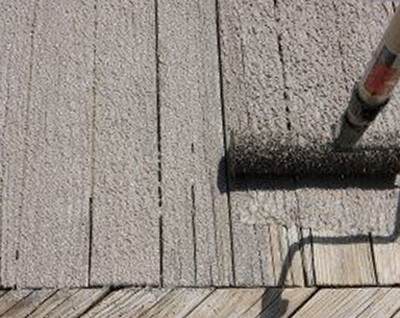
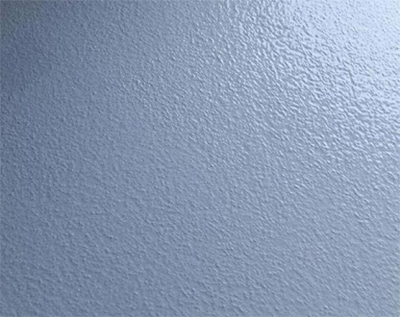
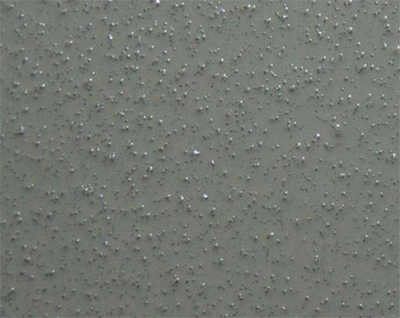
Total Score: C
Effectiveness: B
Installation & Maintenance: D
Durability: B
Initial Price: C
Long-Term Value: C
